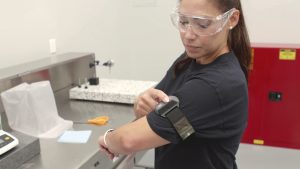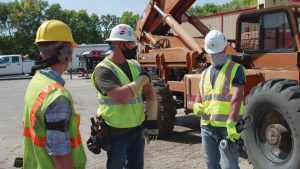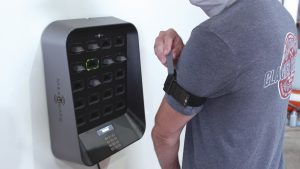It started as a single question in a loud, pandemic-influenced Sioux City popcorn factory: How do we meet our obligation to monitor employee hearing if COVID-19 social distancing requirements are blocking us from running hearing tests in the usual way?
The answer, which American Pop Corn Company discovered with help from CIRAS, involves new workplace safety technology from a groundbreaking Iowa company.

MākuSafe, based in West Des Moines, makes wearable devices with sensors that can monitor the conditions on a factory floor. The devices record a variety of data about environmental concerns such as air quality, noise exposure, or the presence of high heat as well as potential harmful human motion like slips and trips. To preserve privacy, biometric information about individual workers is not tracked.
“It’s working really well,” said Zoe Knudsen, American Pop Corn’s safety manager. “We’ve come up with a way to harness all the information that we’re getting from the devices . . . and it’s also made us more aware of the hotspots in our production areas, places where we maybe need to put some more slip protection on the ground.”
Chris Hill, director of the CIRAS Technology Assistance Program, said CIRAS experts began working with MākuSafe while looking for technology that could be used to help companies with COVID-19 contact tracing. CIRAS is now helping multiple companies via projects using MākuSafe for an overall safety upgrade.
“It’s about capturing and using data to quickly identify opportunity areas to focus your improvement efforts,” Hill said. “This will drive a return on your investment.”

“Connected workers are the future of every work site across the planet,” said MākuSafe CEO Gabriel Glynn. “Just like safety glasses, hearing protection, and hard hats, workforce wearables are the next evolution.”
Knudsen said American Pop Corn is using the devices to monitor decibel levels in two areas containing a total of 19 microwave popcorn production lines. The goal, in an environment where COVID-19 quarantines have sparked higher demand and ramped up popcorn production, is to be certain that factory noise never overwhelms the hearing protection that workers have been supplied.
Additionally, American Pop Corn is gathering information from repetitive-motion and rapid-motion sensors contained in the devices. Tracking the data over time will help the company spot potential problems before any injuries occur. The company has estimated that it will save at least $35,000 annually by addressing these issues and preventing more serious injuries.
American Pop Corn Company purchased its first 20 MākuSafe sensors at the end of 2020. CIRAS helped the company understand MākuSafe as part of the efforts through its Digital Manufacturing Lab to help familiarize manufacturers with Industry 4.0 technology.
“Being a smaller company, trying new things is sometime difficult,” Knudsen said. “Having worked with CIRAS in the past on other projects helped make it easier for us to take the leap in trying the device within our facility.”

Weiler, a heavy construction equipment manufacturer based in Knoxville, is another business that has worked with CIRAS to bring MākuSafe to its plant. The company now has 60 devices that it uses to monitor employee safety and to give workers an easy way to leave voice memos for supervisors about safety items in the plant that need attention.
“We’ve already found a handful of tasks where our employees were triggering the forceful motion sensor,” said human resources operations manager Joel Weiler. “As a result, we’ve already had some quick, easy wins out in the plant to make tasks more ergonomic.”
Although it’s too early to quantify any potential savings from reduced medical issues, Weiler believes the devices will be valuable over the long term. He credited CIRAS for de-risking the initial launch of the company’s pilot MākuSafe project.
“It really lowered the barrier of entry for us,” he said.
For more information, contact Chris Hill at chhill@iastate.edu or 515-313-8251.
A version of this article was published in the Summer 2021 edition of CIRAS News.